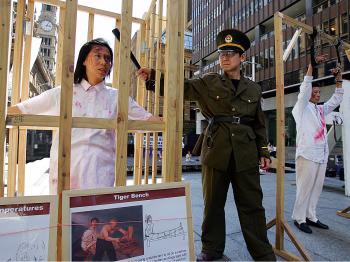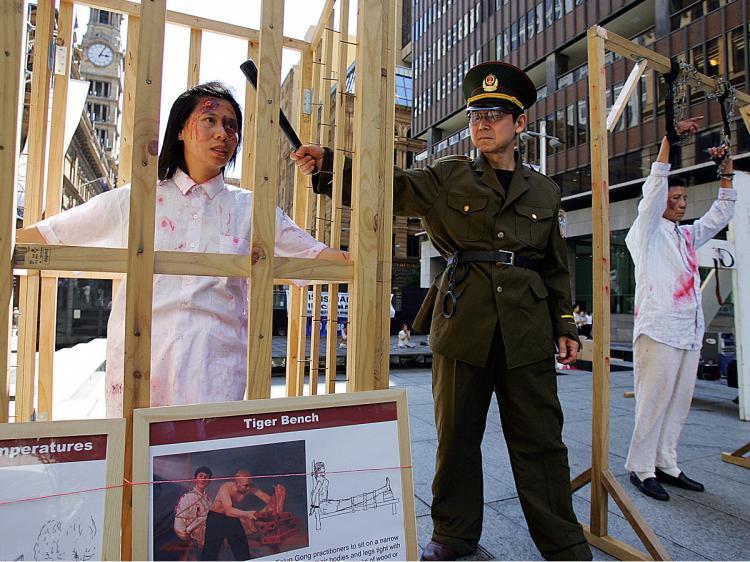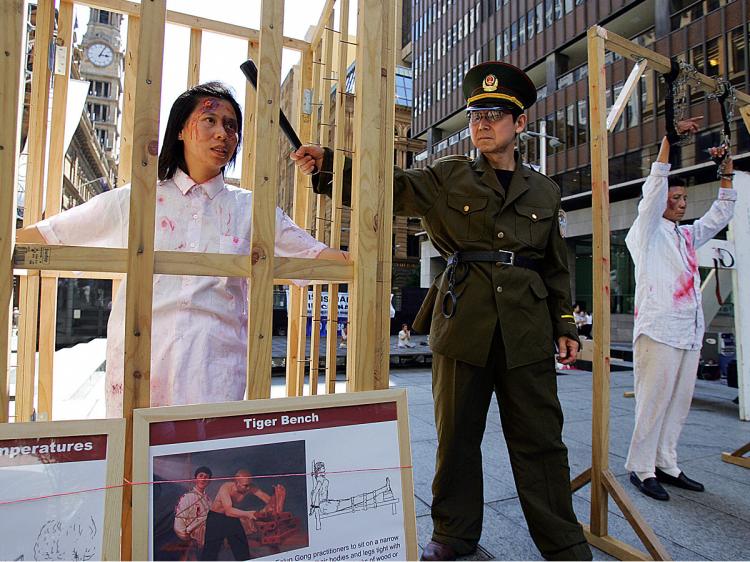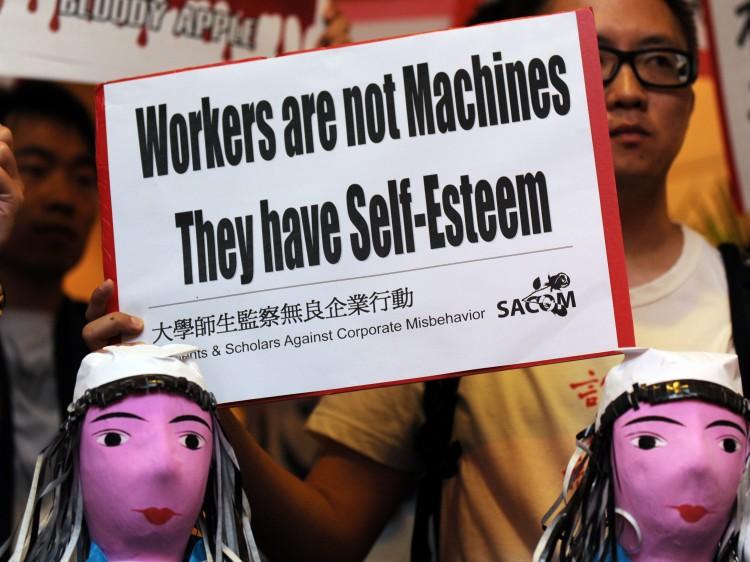On April 23, 2009, the Chinese regime’s spokeswoman claimed that, since it had persecuted Falun Gong “in accordance with the law,” it had broken no laws. The spokeswoman reiterated its slander that Falun Gong deprives others of their human rights by “controlling people’s minds, resulting in the illness, disability or even death of many innocent people and practitioners,” and that the persecution of Falun Gong “shows that the Chinese government cares for its people.”
This spokeswoman failed to explain how the Falun Gong group deprived others of their rights, whether they were the rights to freedom of belief, expression, association, or other rights proclaimed in the Universal Declaration of Human Rights. Perhaps the “human rights” referred to were from the CCP’s Orwellian newspeak dictionary.
As for “causing illness, disability or even death,” after ten years of the CCP’s persecution that itself has resulted in immeasurable illness, disability and even death, one would expect there to be an abundance of court proceedings and investigation records on these purported homicides or bodily damage cases, but the spokeswoman failed to produce any. These are all interesting topics to analyze, but that will be for another article.
Here we will just focus on the “broken no laws” claim.
The first example is from the 2007 annual reports of three United Nations Special Rapporteurs: on Violence against Women, on Freedom of Religion or Belief, and on the Question of Torture.
On December 29, 2005, prompted by information submitted by the Falun Gong Human Rights Working Group, the three Special Rapporteurs sent a joint intervention to the Chinese government concerning Ms. Liu Jizhi, age 51, and Ms. Han Yuzhi, age 42, both of whom are Falun Gong practitioners, “On the night of 24 November 2005, Liu Jizhi was abducted by an estimated seven policemen. Her home was ransacked and all Falun Gong materials were seized. … [S]he was interrogated, beaten with rubber clubs and given electric shocks with stun batons.
“At approximately 2 p.m. on 25 November 2005, a police officer called He Xuejian took Liu Jizhi to a room, where he lifted her shirt and touched her breasts. He then gave her electric shocks on her breasts with a stun baton. Another police officer called Wang came into the room and encouraged He Xuejian to beat her up.
“After Wang left the room, He Xuejian raped Liu Jizhi. While raping her, he repeatedly slapped her in the face. He then brought Han Yuzhi into the same room and raped her too. Both rapes took place in the presence of another police officer, who made no attempt to intervene or prevent the incidents.”
The Chinese government responded on June 28, 2006, to the joint intervention, “The authorities promptly summoned the policed officer in question. In the ensuing questioning and investigation, it was ascertained that he was a temporary employee in the Dongchengfang Township Public Security Office. He admitted that, in the afternoon of 25 November 2005, he had taken LJ and HY in turn back to his hostel, where he had indecently assaulted LJ and had raped HY.”
So if the Chinese regime had broken no laws while persecuting Falun Gong, then rape, beating, and electric baton shocks must all be “in accordance with the law”—in the CCP’s dictionary, of course.
The second example, a group case, is from Opinion No.7/2003 adopted by the United Nations Working Group on Arbitrary Detention. This working group adopts an adversarial court deliberation style working method, hearing presentations from both the plaintiffs and the concerned government before adopting its opinion.
Opinion No.7/2003 concerns a group of Falun Gong practitioners incarcerated by the Chinese government, and reads, “The detention of Chen Gang, Zhang Wenfu, Wu Xiaohua, Liu Junhua, Zhang Jiuhai and Zhu Xiaofei is arbitrary, being in contravention of articles 18 and 19 of the Universal Declaration of Human Rights, and falls within category II of the categories applicable to the consideration of cases submitted to the Working Group.”
So if the Chinese had broken no laws while persecuting Falun Gong, then violating articles 18 and 19 of the Universal Declaration of Human Rights must be “in accordance with the law”—in the CCP’s dictionary, of course.
Example three is from a letter by the courageous human rights lawyer Gao Zhisheng. In the letter, Mr. Gao noted what a torturer shouted at him while torturing him, “Didn’t you [curse word deleted] say the CCP uses torture? Now we are going to let you [curse word deleted] taste all of the tortures. Torture Falun Gong? Darn right. Every bit of it is true; what we are doing to you, the whole twelve courses, all came from there. Tell you what, who the hell cares if you will write about this. There is no way you are getting out of here alive!” [http://www.theepochtimes.com/n2/content/view/11777/]
So if the Chinese had broken no laws while persecuting Falun Gong, the whole twelve courses of torture must be “in accordance with the law”—in the CCP’s dictionary, of course.
Yet, looking at its words rather than its acts, some people too often unwittingly comment on such a barbaric lawless regime, which persecutes not only Falun Gong, but also the Tibetans, the Uyghurs, Christians, democracy activists, human rights defenders, union activists, environmental activists, and anyone who dares to dissent, with such affirmative statements as, “China is making progress in the rule of law.”
It is precisely in the verbiage, “progress in the rule of law” that the deterioration in human rights hides. No other regime is as shrewd and shameless as the CCP in putting up an impressive, indeed even praiseworthy façade of human rights improvement: passing amendments to its constitution to protect human rights, passing legislation to prevent human rights violations, engaging in human rights dialogs, making promises on human rights improvement, participating in technical collaboration on human rights learning and training, appearing to consider recommendations on how to protect human rights, as in its most recent endeavor, developing a Human Rights Action Plan.
Many people, particularly those from the West, lament, “China has laws; it is just that they are not implemented.” Wrong. They have been implemented: as window dressing, to deflect international criticism, and to be able to declare with a straight face, as the thick-skinned spokeswoman did, that all the persecutions are “in accordance with the law.,”
The Chinese regime’s claim of “rule of law” is not difficult to see through, for no genuine rule of law will seek to persecute so many human rights lawyers for upholding the law, like Gao Zhisheng, the Yitong law firm*, Cheng Hai, Liu Yao, or Guo Feixiong. Yet it is behind the paper progress in the rule of law that China’s human rights conditions continue to deteriorate.
To cover up more human rights violations, the Chinese regime keeps coming up with more legislation “designed to protect human rights.” Many unwitting observers fall for this game of “progress on paper and deterioration in reality.”
Seeing how the regime’s National Human Rights Action Plan consists almost exclusively of more “progress in the rule of law,” and how the regime has claimed it carries on the persecution of Falun Gong “in accordance with the law,” it ought to wake some people up: the CCP’s legislation is never designed to protect human rights; on the contrary, it is designed to provide a cover for more human rights violations “in accordance with the law.”
*The Yitong Law Firm has represented Hu Jia, an AIDS activist who received the European Parliament’s top human rights award last year and is now serving a three-year sentence for inciting subversion. Yitong has been a leading light in the “rights defense movement,” See: http://www.csmonitor.com/2009/0225/p01s01-woap.html



